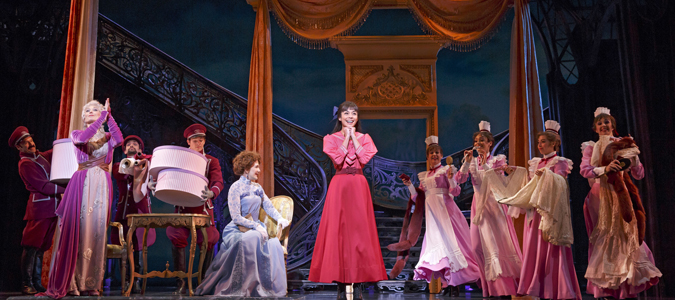

Gigi
Opening Night: April 8, 2015
Closing: June 21, 2015
Theater: Neil Simon Theatre
Set during the turn of the 20th century, Gigi tells the story of a free-spirited teenage girl living in Paris who is groomed (in the custom of her family) to serve as a companion to a bored, wealthy playboy until the pair realize they have fallen in love. Gigi features the memorable tunes “Thank Heaven For Little Girls,” “I Remember It Well,” “The Night They Invented Champagne,” “It’s a Bore,” and more.
BUY TICKETSREAD THE REVIEWS:
April 8, 2015
A shower of soap bubbles descends upon the audience at the finale of the pretty and pleasant revival of the musical “Gigi” that opened at the Neil Simon Theater on Wednesday. The gentle downpour is meant to evoke the fizz in a glass of Champagne, the delights of which have been celebrated in one of the bounciest songs from the score by Alan Jay Lerner and Frederick Loewe. But it inadvertently brought to mind how thoroughly the musical, about a young woman being groomed for a life as a courtesan in turn-of-the-20th-century Paris, has been scrubbed of anything even remotely naughty or distasteful. In this squeaky clean version of the material, Gigi’s potential future as a demimondaine — that’s French for high-end prostitute — is alluded to in such delicately vague terms that no parent chaperoning a tween fan of the show’s star, Vanessa Hudgens, of “High School Musical” renown, will have much explaining to do after the curtain has fallen. You probably remember the most uncomfortable passage in the froufrou-bedecked 1958 film, which won a hefty nine Oscars including best picture (and which was also more treacly than the Colette story on which it was based). Recall Maurice Chevalier, playing the narrator, the suave silver fox Honoré Lachaille, singing “Thank Heaven for Little Girls” as he strolls through the Bois de Boulogne, eyeing young girls romping in the park.
READ THE REVIEWApril 8, 2015
Given her famously ambivalent acquaintanceship with Coco Chanel, it seems possible that novelist Colette might be rolling her eyes, if not quite rolling over in her grave at Père Lachaise Cemetery, upon discovering that double-G T-shirts mimicking the interlocking-C Chanel logo are being sold at the merchandise stand for “Gigi.” That crass marketing invention notwithstanding, a lazy eye roll is about the most extreme reaction likely to be provoked by this pretty but charm-deficient revival of the Lerner and Loewe musical, which plants an all-American, too-contemporary Vanessa Hudgens in a wanly unatmospheric Belle Époque Paris. Based on the 1944 novella by Colette,”Gigi” was first adapted as a 1949 French film, and then a 1951 Broadway play by “Gentlemen Prefer Blondes” author Anita Loos, starring a then-unknown Audrey Hepburn in the title role. But the literary property found its most enduring form in the 1958 Vincente Minnelli film starring the incandescent Leslie Caron, which collected nine Oscars and became regarded as the glorious swan song of the opulent MGM movie-musical era.
READ THE REVIEWApril 8, 2015
The movie Gigi with book and lyrics by Alan Jay Lerner, music by Frederick Loewe and direction by Vincente Minnelli won the 1958 Oscar as best movie. That was one of nine — count ’em, 9 — Oscars handed the box-office hit. Others included best screenplay adaptation (Lerner), best song (Lerner and Loewe’s title tune), best costumes (Cecil Beaton) and best direction (Minnelli, of course). The reference to the release from Arthur Freed’s incomparable MGM unit is recorded here as preamble to the unhappy news that a woefully cheap travesty of the gloriously romantic film has now opened at the Neil Simon. I mean “cheap” figuratively, as actual money was clearly spent on the production, especially on costumer Catherine Zuber’s evocation of Paris, 1900. Zuber’s work, however, is the only more than acceptable element here, although good as she always is, she’s no Cecil Beaton in this instance. Why the numerous producers bothered is the first big question mark. Ostensibly, this Gigi could be called a revival. A previous Gigi was brought to the stage in 1973. Running for only 103 performances, it was a financial flop — and that was when Lerner, who died in 1986, and Loewe, who died in 1988, were on hand to guide the transition.
READ THE REVIEWApril 8, 2015
Vanessa Hudgens brings verve and vivacity to a reimagined version of the classic musical “Gigi”—a production equally memorable for its rich contributions from Tony winner Victoria Clark, as the carefree young girl’s indulgent grandmother. “Gigi” has just opened at the Neil Simon Theatre, following a world premiere at the Kennedy Center earlier this year. Hudgens, who found fame with Disney’s “High School Musical” series, makes her Broadway debut as the bubbly title character, who is expected to follow in the footsteps of her “Mamita” (Clark) and aunt (Dee Hoty, of “Footloose”), both self-assured courtesans in La Belle Epoque Paris. In their midst are the requisite love interest for Gigi (Corey Cott, of “Newsies”) and the young man’s uncle, who is also Mamita’s old flame (Howard McGillin, Broadway’s record-breaking “Phantom”). At heart, “Gigi” is about two young people who figure out they were meant to love each other—after everyone on stage and in the audience already knows it.
READ THE REVIEWApril 8, 2015
Champagne, as Gigi reminds us, “is not actually a force of nature, but the result of industrial chemistry!” Neither natural force nor chemistry, alas, is much in evidence at this fizzless toast to Parisian romance in the Belle Époque. Based on a story by Colette, and its 1958 film adaptation by Alan Jay Lerner and Frederick Loewe, “Gigi” was a flop in its 1973 Broadway debut; Eric Schaeffer’s revival, starring High School Musical’s Vanessa Hudgens as the titular girl, rescues the show from the dustbin of history and moves it to a recycling bin of the present. Revised by Heidi Thomas to accommodate modern sensibilities, this Gigi is inoffensive to a fault. The heroine remains a courtesan-in-training, but she’s been given more spunk, and her sugar-daddy suitor, Gaston (the talented Corey Cott), is closer to her age; “Thank Heaven for Little Girls” is now sung by Gigi’s grandmother (Victoria Clark) and great-aunt (Dee Hoty), instead of an aging playboy (Howard McGillin). But these changes are flowery paper on a crumbling wall. Gigi is the story of a girl being groomed to sell herself, and when the musical dances around that—however attractively, thanks to Joshua Bergasse’s swift choreography—it feels evasive.
READ THE REVIEW






















